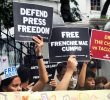Statement of condemnation of the Center for Environmental Concerns to the recent Kidapawan Massacre
The Center for Environmental Concerns (CEC) strongly condemns the brutal dispersal and killings of the peasant protesters in Kidapawan City, North Cotabato last April 1, 2016. The farmers were part of the 6,000-strong barricade that started last March 30, 2016 at the Davao-North Cotabato National Highway to demand rice subsidy and calamity funds from the provincial government of North Cotabato, due to the extreme drought that has dried their farms and killed their crops. The peaceful protest was brutally dispersed by the provincial command of the Philippine National Police (PNP) that led to the death of at least two individuals including a farmer and a bystander, more than 70 detained and at least 116 reportedly injured.
The El Niño season that started early last year was forecasted to be worse than the 1997-1998 cycle, according to PAG-ASA. El Niño is a global weather disturbance that is associated with extreme climatic conditions (CEC 2000). Scientists have discovered that an abnormal rise in water temperature – between 4˚-5˚ centigrade in the Pacific is causing this disturbance and occurs between 2-9 years and may last for 16-24 months. This period’s El Niño is seen as worse than before as this is compounded by the worsening climate and extreme weather events.
The extremity of this event has caused the province of North Cotabato to declare a state of calamity as early as January this year because of extreme drought affecting rice and crop production. This has also led the thousands of farmers to protest and form the barricade. The farmers through their organization representatives from the Kilusang Magbubukid ng Pilipinas (KMP) have been negotiating since to the provincial government’s office to immediately release calamity funds and provide 15,000 sacks of rice and food subsidy to the hungry communities as soon as possible. However, the administration of North Cotabato under Governor Lala Talino-Mendoza, have told the groups that they can only provide three kilos each as there are not enough funds already, and that this will be provided through their town mayors. The farmers do not want to go back to their farms with empty stomachs thus, continued to barricade the highway.
Videos and reports from the local media and people’s organizations in the ground have witnessed how the police brutally dispersed the farmers with water canons, shields, batons and M16 rifles that led to the demise of three and more than a hundred injured. Harassments continued as farmers took shelter in the United Methodist Church where they were blocked from leaving by hundreds of police and military men.
The El Niño season, as pointed out by the Kilusang Magbubukid ng Pilipinas (KMP) did not start just this year but has actually started more than a year ago. Since January 2015, at least 50,000 hectares of rice and corn farms in the province has been affected by the drought causing hunger to more than 25,000 farmers. Despite warnings, the government failed to deliver precautionary and immediate mechanisms how to address the problem.
The Center for Environmental Concerns (CEC) stands that such neglect of the warnings and lack of response by Aquino’s government is the disaster that starved peasants. While the Philippines is indeed in a geographically vulnerable location, the people’s vulnerability is worsened, primarily, by the government’s inefficient disaster and calamity response, such as what is happening in the El Niño crisis. The lack of preparations and even post-El Niño plans of the government is what made this a crisis.
According to the Presidential Communications Operations Office Secretary, Herminio Coloma Jr., President Benigno Aquino III had ordered the formation of Cabinet task forces and assigned the National Disaster and Risk Reduction Management Council to work on food security in preparations for the upcoming El Niño. The Department of Agriculture has also boasted on their cloud-seeding project that aims to relief water supply in the farms. However, these are also short-term and weak solutions. The farmers need more than just rain.
The farmers’ poor conditions have already existed ever since lands are concentrated to only a few families. Even with land, farmers could still not survive because of very poor or lack of subsidies from the national government. Their socio-economic conditions compounded with climate-related events and man-made hazards are resulting to increasing vulnerabilities. The farmers’ vulnerabilities are rooted from the lack of genuine agrarian reform in the country. They are also victims of the high price of farm inputs, rent of farming equipment and irrigation fees. The government’s Comprehensive Agrarian Reform Program (CARP) has utterly failed due to loopholes in the law and aversion to tilt the balance of power in a landlord-dominated society.
The CEC stands that a long-term solution to this crisis is genuine agrarian reform where lands will be distributed to the tillers and support services be provided. It is the government’s obligation to provide for its people’s survival needs, in the face of its failures to provide basic reforms and not shoot them.
We demand that the Philippine National Police, local and national government be held accountable to the incident of killings. Immediate relief such as rice subsidy and disaster assistance should also be provided. This also includes medical assistance to the victims of the brutal dispersal. The Department of Agriculture (DA) should also account for the calamity and El Niño funds.
The El Niño phenomenon, in the context of climate change, has been forecasted years ago, the least the Aquino government could have done was to prepare our farmers for it, as well as it prepares its relief assistance. The recent Kidapawan massacre only betrays how negligent this government is when it comes to people’s welfare and disaster risk reduction and management amid all the lip service. Instead, the farmers were faced with bullets and, now, harassment. It is not El Niño that killed the farmers, but the government and its agencies. Drought is avoidable only if these farmers have access to water services. Poverty and hunger is preventable only if the people have the equal share and access to resources. Disaster is preventable only if the government will provide and do its obligations to its people.
The CEC salutes all the farmers and indigenous people asserting their rights to land and life. Together with environmental advocates and scientists, we are with you in your struggle for a just and humane society.





![[ANALYSIS] A different drug war](https://davaotoday.com/wp-content/uploads/2024/09/1000019103-110x100.png)




